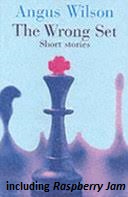Sir Angus Frank Johnstone Wilson, KBE (11 August 1913 – 31 May 1991) was an English novelist and short story writer. He was awarded the 1958 James Tait Black Memorial Prize for The Middle Age of Mrs Eliot and later received a knighthood for his services to literature.
Wilson was born in Bexhill, Sussex, England, to an English father and South African mother. He was educated at Westminster School and Merton College, Oxford, and in 1937 became a librarian in the British Museum's Department of Printed Books, working on the new General Catalogue. During World War II, he worked in the Naval section Hut 8 at the code-breaking establishment, Bletchley Park, translating Italian Naval codes.
The work situation was stressful and led to a nervous breakdown, for which he was treated by Rolf-Werner Kosterlitz. He returned to the Museum after the end of the War, and it was there that he met Tony Garrett (born 1929), who was to be his companion for the rest of his life.
Wilson's first publication was a collection of short stories, The Wrong Set (1949), followed quickly by the daring novel Hemlock and After, which was a great success, prompting invitations to lecture in Europe.
He worked as a reviewer, and in 1955 he resigned from the British Museum to write full-time (although his financial situation did not justify doing so) and moved to Suffolk.
From 1957 he gave lectures further afield, in Japan, Switzerland, Australia, and the USA. He was appointed a Commander of the Order of the British Empire (CBE) in 1968, and received many literary honours in succeeding years. He was knighted in 1980, and was President of the Royal Society of Literature from 1983 to 1988. His remaining years were affected by ill health, and he died of a stroke at a nursing home in Bury St Edmunds, Suffolk, on 31 May 1991, aged 77.
His writing, which has a strongly satirical vein, expresses his concern with preserving a liberal humanistic outlook in the face of fashionable doctrinaire temptations. Several of his works were adapted for television. He was Professor of English Literature at the University of East Anglia from 1966 to 1978, and jointly helped to establish their creative writing course at masters level in 1970, which was then a groundbreaking initiative in the United Kingdom.

